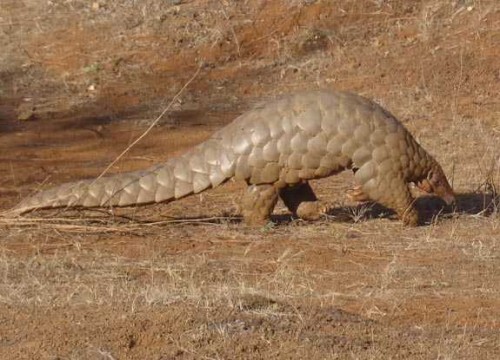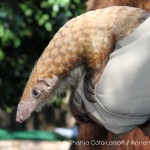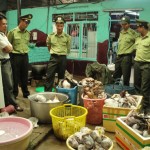
Researchers in Pakistan warn that the country’s pangolins are under tremendous pressure from China’s appetite for the scales and flesh of this imperiled species.
The brutal slaughter of 118 pangolins between January 2011 and May 2012 is documented in the August 2012 report Illegal Mass Killing of Indian Pangolin (Manis crassicaudata) in Potohar Region, Pakistan by Tariq Mahmood, Riaz Hussain, Nausheen Irshad, Faraz Akrim, and Muhammad Sajid Nadeem. Through field visits and interviews with local people, the authors determined that the main participants in killing pangolins for the illegal trade are “trained local hunters and nomads”. (Download the report here.)
A grisly combination of “dead bodies, skeletons, scale jackets, live captured or reportedly killed and or traded in the Potohar Plateau” were recorded, with 60 of the 118 deaths occurring in the Chakwal district.
The most miserable incident was the recovery of 45 scale-less decaying dead bodies of this animal species (in March 2012) which were found dumped (in jute sacks) inside an unused railway tunnel near Chakwal city.
Among these were eight baby pangolins.
Regarding the transnational nature of pangolin trafficking, the authors cite an incident from April 2012, in which a suspect (identified as “Zhou”) was arrested in China with 25.4 kg of pangolin scales. Zhou said he acquired the scales while working in Pakistan.
These recovered scales apparently seem to be the same that were collected from the Chakwal district of the study region in February 2012, where they were transported to Islamabad. This fact shows that trade in the Indian pangolin scales have become transnational from Pakistan.
The research team recommends uplisting the Indian pangolin’s status from “Near Threatened” to “Endangered”, and transferring it from CITES Appendix II to Appendix I.
On paper, Pakistan’s pangolins are protected under the Islamabad Wildlife (Protection, Preservation, Conservation, and Management) Ordinance of 1979 and the North-West Frontier Province Wildlife (Protection, Preservation, Conservation, and Management) Act of 1975. However, enforcing the law is another matter, according to a Wildlife Department official who spoke to Pakistan’s Express Tribune under conditions of anonymity.
He shared the department was aware of the excessive hunting of the scaly mammals but being short-staffed were unable to do much. The official corroborated Kohat, Darra Adam Khel, Peshawar, Frontier Region Peshawar, Mardan, parts of Charsadda and Nowshera were hotbeds of pangolin hunting but no one was paying any attention.
While at the CITES CoP16 meeting in Bangkok, I attended the Symposium on Combating Wildlife Crime side event. One of the panelists was Justice Syed Mansoor Ali Shah, Lahore High Court, Pakistan, who spoke quite candidly about wildlife crime law enforcement in his country. Several times during his talk, the Justice expressed his concern for the fate of confiscated animals, saying that the penalties for wildlife crime are “currently insufficient”.
Justice Shah also said he is very interested in innovative concepts, such as rewarding “whistleblowers” and blacklisting companies which are involved with wildlife crime (excellent ideas, in my opinion).
But there is good news for the pangolins of Pakistan: I think the recent increased attention on this issue is helping to create awareness, which in turn, can build momentum in support of enforcing penalties for illegal trade in pangolins and other protected species.
Take the first step for pangolins now by sharing this article (and our other pangolin articles) across your social networks and help educate others about this unique and important species.


![Pangolin Scales Seized in Hong Kong, 2 Arrested [Photos]](https://annamiticus.com/wp-content/uploads/2013/11/PangolinScalesHongKong02-150x150.jpg)

